2024 Polaris Xpedition First Drive: The UTV for adults

About 75 miles into my off-road drive of the new Polaris Xpedition in Arizona, the desert skies open up and it starts to rain. In a traditional open-air side by side I’d have to break out my rain gear and prepare myself for a cold and wet journey. In the Xpedition I just roll up the windows and flip the windshield down.
Game. Changer.
Side-by-sides are traditionally designed to rip around the desert at high speeds, wind in the hair and dust over the goggles. They are geared for performance and fun, but comfort…not so much. Polaris looks to change that with its line of Xpedition machines. These enclosed UTVs are the next step in comfort and utility for a more adult owner.
The trim line-up of the new Xpedition is a bit complicated. The XP and ADV are two-door models while the XP-5 and ADV-5 have four doors and room for five. The XP models have an open dump box in the back while the ADV models have an enclosed rear box. Then within each of those are Premium, Ultimate and Northstar trims.
However, there isn’t much difference between those three trims. The base Premium gets a 4.3-inch display screen, a downgraded stereo system and a 600-watt stator charging system. Moving up to Ultimate nets a better sound system, a larger display screen with Polaris’ Ride Command technology, a 900-watt charging system, a winch, front and rear cameras and a tilt and telescoping steering wheel. Northstar models go big with an upgraded Ride Command system, a fully-enclosed cabin with power windows and locking doors, a tilting windshield and the ever-coveted HVAC system.
However, all trims get the same 114 horsepower out of the 1000cc engine, a continuously variable transmission, a two-speed transfer case with low range, 14 inches of ground clearance and 30-inch ProArmor Crawler XP tires. The three-position adjustable shocks are courtesy of Fox, with bodies measuring two inches in the front, 2.5 inches in the rear. The front wheels have 14 inches of travel, the rears 15 inches.
I am immediately smitten with the two-door ADV Northstar in the Matte Orange Rust. Maybe including the word “rust” in the color is not the best marketing ploy but this thing is adorable. I even like it in Storm Blue, the only other color on tap. The wheelbase is a mere 87.5 inches, it’s 122.5 inches long and 64 inches wide. I just want to put it in my pocket.
However, Polaris gives me the larger ADV-5 Northstar for our off-road excursion. Here the width stays the same but the wheelbase is stretched to 117 inches and overall length sits at 152.5 inches. That’s the same wheelbase and width as the popular RZR XP 4, but the Xpedition is 6.5 inches longer overall.
Putting the thing in gear takes a bit of muscle and newbies will be alarmed by the noise of the CVT. I expect it and I still want to upshift to give the engine a break from the 6,000 rpm engine speed – and I’m just pulling out of the staging area. However, I’ll soon find that a CVT is the right application for this vehicle, allowing for constant power and quick acceleration.
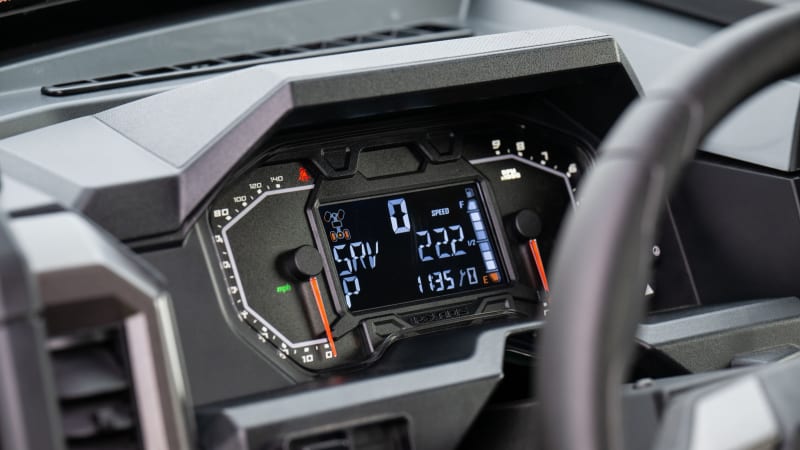
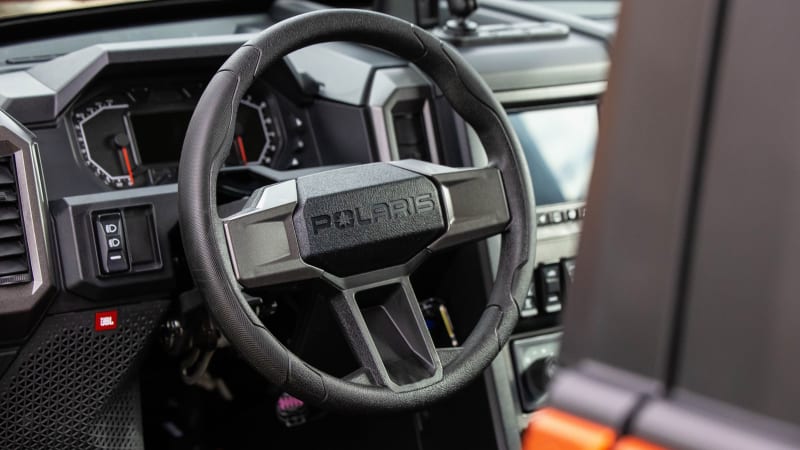
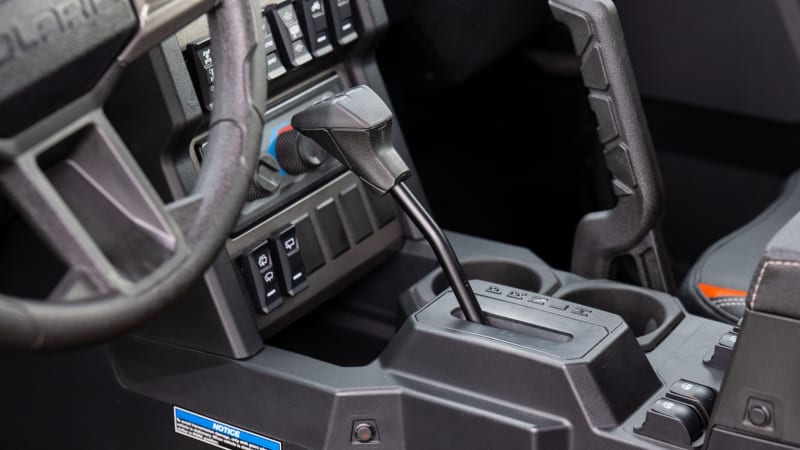
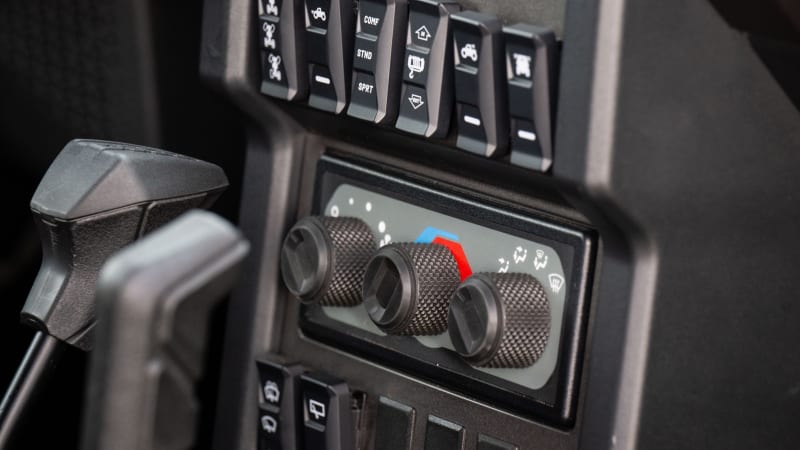
Side-by-sides have never really been my cup of off-roading tea, but I can’t say they aren’t capable. Our ride takes us over flat gravel roads at speeds of 60 miles per hour, through twisty narrow trails lined with juniper trees, across bumpy washes and uphill through rocks that I am still convinced was a river bed and not a trail. The Xpedition can handle it all.
While the Xpedition isn’t meant for go-fast antics – for that you’ll want a Polaris RZR with more travel and up to 225 ponies on tap – you can still rip pretty hard. Although my brain can’t quite grasp it, the chassis can soak up anything I throw at it and I don’t have to lift at all over most dips and whoops. Excellent geometry all the way around means hardly anything touches the front skid plate or belly pans and the tires don’t seem to give a crap about any rocks I roll over.
Driving one of these with air conditioning is truly amazing. Yes, I feel like a bit of a wimp with the Polaris PR folks riding in open-air RZRs, but screw it, I’m comfortable. The air conditioning isn’t what I would call icy cold, but before the rain starts outside temperatures are in the 90s and not a drop of sweat touches my brow. I don’t get a chance to sample the heater but this is a rig you can wheel year round.
When it comes time to do a little rock crawling, I literally just put the Xpedition in low range, simply look where I want to go and the thing just goes there. I hardly have to think about it. The full-time rear locker and low gearing get the job done easily. In a truck or SUV I’d have to get out and scout, plan my route or have a spotter. This machine just says, “F*(# it, Hall. Let’s go.”
And it goes more smoothly and quicker than any stock truck or SUV out there. After riding for over 100 miles my neck doesn’t hurt, my arms aren’t tired and my shoulders feel great. My ears are ringing a bit from the loud motor and the even louder classic rock I play over the stereo system, but overall I feel like I could take a hike, paddle a canoe down the river for a bit or take a spin on a mountain bike.
However, I am forced to wait out the rain for a bit. I pop up the windshield for some air circulation and take stock of the interior. I’ve had the windows both up and down during the day so the cabin is far from clean, but the rubber and plastic materials would be easy to wipe down. There is a padded center armrest concealing a fairly deep storage cubby with a 12-volt outlet and a USB-A port. Another cubby sits below the HVAC controls and there is also a glove box with a USB-A port.
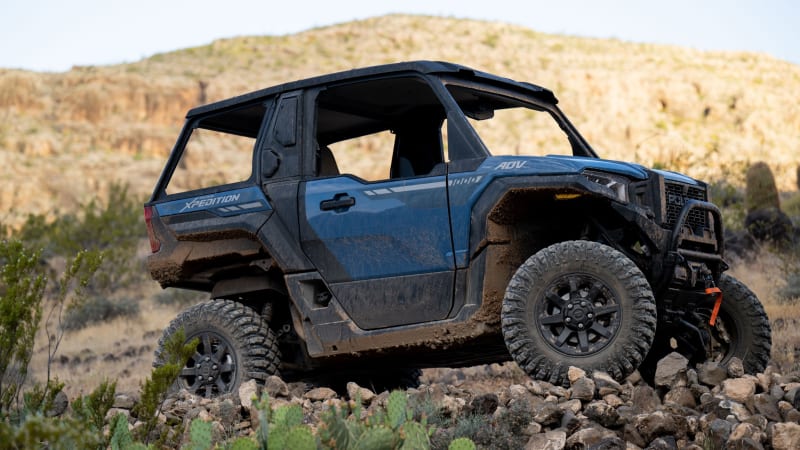
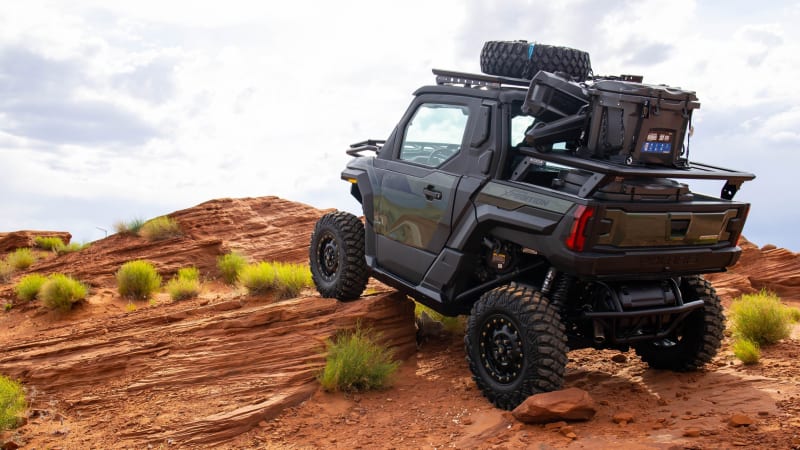
The Ride Command system can connect to my phone and I have my Spotify playlist downloaded for some tunes. The Group Ride feature shows the location of others in my group as long as they are 3 miles or so away from me, longer if there is a direct line of sight. The system daisy chains off the cars so even if the lead car is 12 miles ahead, as long as there is an Xpedition every 3 miles or so the rear vehicle still knows where everyone is. There are also plenty of pre-loaded trails in Ride Command for exploring.
The Polaris’ cargo box can hold 600 pounds and overall payload capacity for two-door models is 1,030 pounds, while the four-doors can handle 1,160 pounds. There are four tie downs in the box and its measurements are 36.2 x 47.25 x 13.38 in, but the rear seat in four-door models can also fold down in a 60/40 split for more room. Remarkably, the Xpedition can tow 2,000 pounds, so go ahead and tow your Wave Runner to the lake. You’ll be fine.
Once the rain stops it’s time to set up camp. Oh, did I mention that my tester has a rooftop tent? Buyers can purchase myriad accessories to kit out their rig. Mine has a Rhino rack with a rooftop tent but buyers can also get a whole slew of gear including a kayak holder, a gun-mount bracket or even a push frame for a plow.
The Xpedition can handle 150 pounds of dynamic load on its roof – more on that in a minute – and the static load is 500 pounds. The Polaris-branded rooftop tent can be a bit of a pain to set up, but practiced users can probably do it in five minutes or so. Regardless, my night spent in the tent is warm and dry. I find the padding to be a bit too hard for my liking, but I’m a delicate flower and require plush bedding to be happy. You might like the firm cushion.
Of course, it’s not all puppy dogs and rainbows, especially when you start adding weight to the roof of a vehicle. Side by sides are already notorious for being comparatively easy to roll, and putting 150 pounds up top only makes it worse. I can feel the weight during cornering and it keeps me from really railing around any turns. One person in our group gets a little sideways and learns about physics the hard way when the Xpedition goes rubber-side up. No injuries are reported, but it’s enough to convince me to just take a ground tent instead.
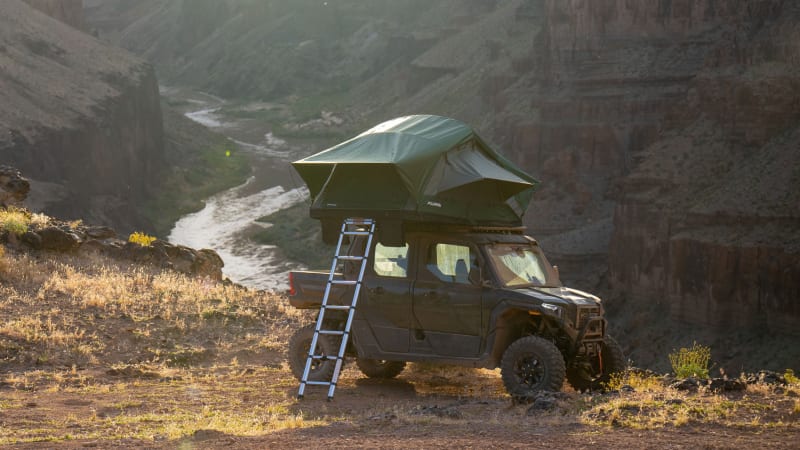

I have a few other quibbles here and there. The side mirrors and rear view mirrors don’t stay put and I’m constantly readjusting them. Rain seeps in through the windshield and the wiper blade smears dirt around unless the glass gets really wet. The rig needs a dust light and a horn and the seats could use more bolstering.
Polaris says the Xpedition can get up to 200 miles of range out of its 12.5 gallon fuel tank, or about 16 miles per gallon. However, the rig’s computer tells me that over 107.5 miles I used 63-percent of my fuel. Some loose math tells me this is an average of around 13.6 mpg, with the caveat that my Xpedition is in four-wheel drive the entire time.
The 2024 Polaris Xpedition starts at $28,999 for an XP Premium and goes all the way up to $44,999 for an ADV-5 Northstar. Will it entice folks from the truck and SUV world? It certainly is quicker and smoother, but folks who want to carry a ton of gear likely won’t be swayed. However, current Polaris customers who yearn for more creature comforts should be thrilled with this new platform.
Strangely the base Premium trim won’t ship until 2024, while the Ultimate and Northstar trims will ship this summer. If you’re thinking of buying this or any side-by-side, I encourage you to find a riding school so you can understand your limits and that of the vehicle and educate yourself on Tread Lightly principles. Find a local group of experienced owners who demonstrate land stewardship to ride with, wear your safety gear and remember to save the adult beverages for around the campfire.







